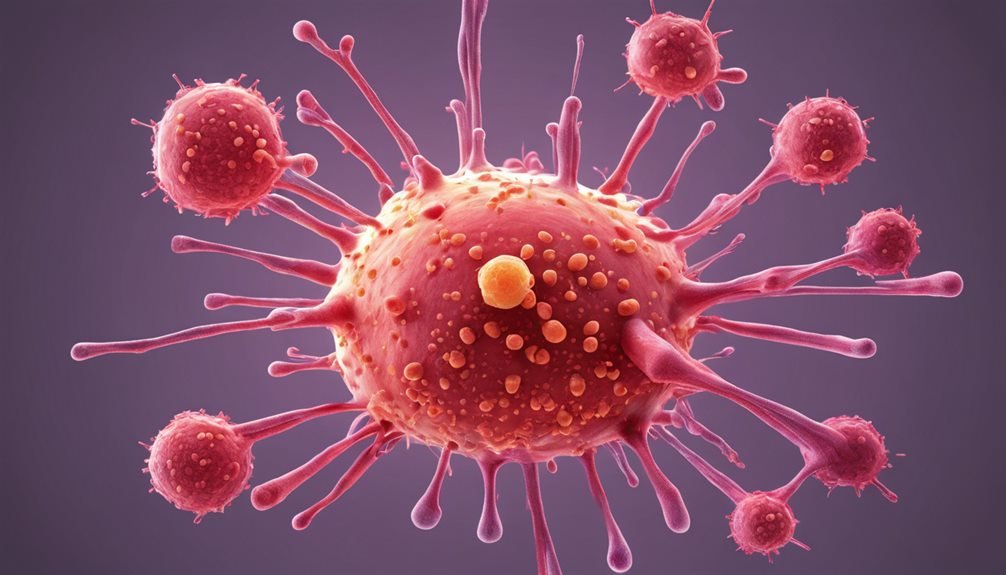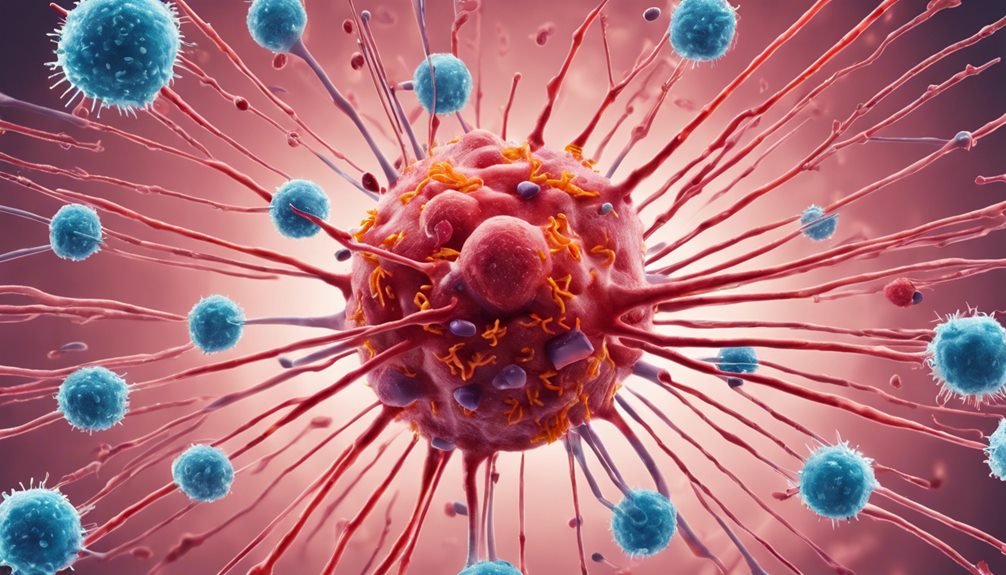When it comes to your health, understanding how sugar influences cancer development is paramount. The intricate relationship between sugar consumption and cancer risk goes beyond just empty calories. Unraveling the complexities of how sugar fuels cancer cells might make you reconsider your dietary choices. Stay tuned to uncover the eye-opening connection between your sugar intake and potential cancer risks.
Key Takeaways
- Excess sugar intake promotes cancer growth through inflammation and insulin resistance.
- Cancer cells thrive on sugar for energy and rapid growth.
- High sugar consumption can lead to elevated insulin levels, supporting certain cancer cells.
- Understanding sugar's role in tumor growth aids in developing targeted cancer treatments.
- Opt for whole foods and reduce hidden sugars to lower cancer risk.
Sugar's Impact on Cancer Risk
When it comes to understanding the relationship between sugar consumption and cancer risk, it's crucial to delve into the scientific evidence that sheds light on this complex connection. Sugar consumption has been a topic of interest in relation to cancer development. Studies have suggested that excess sugar intake may contribute to an increased risk of certain types of cancer.
High sugar consumption can lead to obesity, which is a known risk factor for cancer development. Additionally, sugar can promote inflammation and insulin resistance in the body, creating an environment that may support cancer growth.
It is important to be mindful of your sugar intake and opt for healthier alternatives to reduce the risk of cancer. Choosing whole foods over processed sugary snacks, and being aware of hidden sugars in beverages and packaged foods, can help in lowering your overall sugar consumption.
Understanding Insulin and Cancer
The connection between sugar consumption and cancer risk often intersects with the role of insulin in the body. Insulin is a hormone produced by the pancreas that plays a crucial role in regulating glucose metabolism. When we consume sugary foods, our blood sugar levels rise, triggering the release of insulin to help cells absorb and use the glucose for energy.
However, consistently high sugar intake can lead to insulin resistance, a condition where cells become less responsive to insulin's signals. Insulin resistance can result in elevated insulin levels in the blood, which may promote the growth of certain types of cancer cells.
Research suggests that high insulin levels can stimulate cell proliferation and inhibit cell death, creating an environment conducive to tumor development. By better understanding the relationship between insulin, glucose metabolism, and cancer, you can make informed choices about your diet and lifestyle to potentially reduce your risk of developing cancer. Remember, maintaining a balanced diet and staying active are key factors in managing insulin levels and promoting overall health.
Sugar's Role in Tumor Growth

Sugar plays a significant role in tumor growth by providing cancer cells with the energy they need to multiply and thrive. Tumor progression is closely linked to the altered metabolism of glucose within cancer cells.
Cancer cells have an increased demand for glucose compared to normal cells, a phenomenon known as the Warburg effect. This heightened glucose metabolism allows cancer cells to fuel their rapid growth and proliferation. By consuming glucose at a higher rate, cancer cells gain a competitive advantage over healthy cells in the surrounding environment.
This process not only supports tumor growth but also aids in the spread of cancer to other parts of the body. Understanding the relationship between sugar, glucose metabolism, and tumor progression is crucial in developing strategies to target cancer cells specifically.
Inflammation and Cancer Connection
Playing a crucial role in the interplay between inflammatory processes and cancer development, inflammation represents a complex biological response that involves various immune cells, signaling molecules, and tissues. Chronic inflammation has been linked to the promotion of tumor growth and progression in various types of cancers. Understanding the connection between inflammation, cancer, and sugar metabolism is crucial for prevention and management strategies.
| Key Aspect | Impact on Cancer Development | Prevention Strategies |
|---|---|---|
| Immune Cell Activation | Promotes tumor growth and spread | Anti-inflammatory diet, regular exercise |
| Signaling Molecules | Alter gene expression in cancer cells | Antioxidant-rich foods, stress management |
| Tissue Damage | Creates a microenvironment favorable for cancer cells | Maintaining a healthy weight, avoiding smoking |
Glycolysis and Cancer Development

Fueling the growth and proliferation of cancer cells, glycolysis plays a pivotal role in cancer development by providing energy through the breakdown of glucose. Understanding the intricate connection between glycolysis and cancer metabolism is crucial in developing targeted therapies.
Cancer cells exhibit enhanced glycolytic activity, even in the presence of oxygen, a phenomenon known as the Warburg effect. This metabolic shift allows cancer cells to meet their high energy demands and support rapid proliferation.
Glycolysis inhibition emerges as a promising strategy to combat cancer progression. By targeting key enzymes involved in glycolysis, researchers aim to disrupt the energy supply essential for cancer cell survival. This approach shows potential in limiting tumor growth and metastasis while sparing normal cells from harm.
Exploring the nuances of glycolysis in cancer metabolism opens new avenues for therapeutic interventions. By deciphering the molecular mechanisms driving this process, scientists strive to develop more effective and targeted treatments that could revolutionize cancer care. Understanding the role of glycolysis in cancer development is a vital step towards personalized and precise oncology interventions.
Sugar's Influence on Metastasis
The metabolic adaptations seen in cancer cells go beyond glycolysis, extending to how sugars influence metastasis. Sugar consumption plays a significant role in the spread of cancer by fueling the processes that support metastasis.
High sugar intake can promote the growth and survival of cancer cells, leading to increased tumor aggressiveness and the potential for metastasis.
Understanding sugar's influence on metastasis is crucial for developing strategies aimed at metastasis prevention. Research suggests that limiting sugar intake may help reduce the risk of cancer spreading to other parts of the body.
By controlling sugar consumption, you can potentially create an environment less conducive to cancer cell migration and invasion.
In your journey to combat cancer, being mindful of the impact of sugar on metastasis can empower you to make informed dietary choices that support your overall well-being. Consider working with healthcare professionals to develop a personalized nutrition plan that focuses on minimizing sugar intake and optimizing your body's ability to prevent cancer metastasis.
Immune System Impacts of Sugar

Research indicates that sugar consumption can have significant impacts on the immune system's function. High sugar intake may lead to a suppressed immune response, affecting the body's ability to combat cancer cells effectively. Sugar consumption has been linked to increased inflammation in the body, which can further weaken immune defenses.
Additionally, excess sugar intake can disrupt the balance of gut microbiota, crucial for a robust immune system. It's vital to be mindful of the sugar content in your diet to support optimal immune function. By reducing sugar consumption and opting for nutrient-dense foods, you can help maintain a healthy immune response and potentially lower the risk of cancer development.
Prioritizing a diet rich in fruits, vegetables, whole grains, and lean proteins can provide the necessary nutrients to support your immune system's ability to ward off cancer cells. Making informed dietary choices plays a crucial role in nurturing a strong immune system and promoting overall well-being.
Sugar and Hormonal Imbalance
How does sugar consumption impact hormonal balance in the body? Hormones play a crucial role in regulating various bodily functions, and sugar intake can disrupt this delicate balance. When you consume excess sugar, it can lead to fluctuations in insulin levels, a hormone that regulates blood sugar.
High sugar consumption may cause insulin resistance, leading to elevated insulin levels and potentially disrupting other hormones like estrogen and testosterone.
Endocrine health, which encompasses the hormonal system, is vital for overall well-being. An imbalance in hormones due to excessive sugar intake can have far-reaching effects on your health. For instance, disruptions in hormonal levels can contribute to issues like weight gain, mood swings, fatigue, and even impact fertility in both men and women.
Being mindful of your sugar intake is crucial for maintaining hormonal balance and supporting your endocrine health. By making conscious choices to limit added sugars in your diet, you can help keep your hormones in check and promote overall wellness.
Dietary Sugar and Cancer Prevention

Dietary sugar plays a significant role in the realm of cancer prevention. Your sugar intake impact is crucial when considering cancer prevention strategies. Research suggests that high sugar intake can contribute to inflammation, insulin resistance, and oxidative stress, all of which are factors that may increase the risk of cancer development. By being mindful of your sugar consumption, you can potentially lower your risk of developing certain types of cancer.
To enhance your cancer prevention strategies, focus on reducing your intake of sugary foods and beverages. Opt for whole, nutrient-dense foods like fruits, vegetables, whole grains, and lean proteins. These choices not only provide essential nutrients but also help maintain a healthy weight, which is another key factor in cancer prevention.
Additionally, staying hydrated with water and incorporating regular physical activity into your routine can further support your efforts in reducing cancer risk. By making these conscious choices, you're taking proactive steps towards protecting your health and well-being.
Sugar's Link to Obesity and Cancer
An excessive consumption of sugar can contribute to the development of obesity, a condition closely linked to an increased risk of cancer. When you consume high amounts of sugar, your body may store excess calories as fat, leading to weight gain. This excess weight not only affects your physical appearance but also plays a significant role in the development of cancer.
Studies have shown that obesity is associated with an increased risk of various types of cancer, including breast, colon, and pancreatic cancer. By reducing your sugar consumption and maintaining a healthy weight, you can lower your risk of developing cancer.
Understanding the impact of sugar on obesity and its connection to cancer is crucial for promoting overall well-being. Making informed choices about your diet and lifestyle can significantly influence your health outcomes. By being mindful of your sugar intake and taking steps to manage your weight, you're actively working towards reducing your risk of cancer and promoting a healthier future for yourself.
Sugar Addiction and Cancer Risk

Research suggests that excessive sugar consumption can lead to addictive behaviors, potentially increasing the risk of cancer development. When you consume high amounts of sugar, your brain's reward system can become desensitized, leading to sugar cravings and a cycle of overconsumption. This addiction to sugar not only contributes to weight gain and obesity but also poses a significant risk for cancer development.
To lower your risk of cancer, it's crucial to address sugar addiction and reduce your intake. By managing your sugar cravings and making conscious choices to limit sugary foods and beverages, you can take proactive steps towards cancer prevention.
Focus on incorporating whole foods, such as fruits, vegetables, whole grains, and lean proteins, into your diet to satisfy your sweet tooth in a healthier way.
Understanding the connection between sugar addiction and cancer risk empowers you to make informed decisions about your dietary habits. By taking control of your sugar consumption, you can work towards reducing your cancer risk and promoting overall well-being.
Strategies for Reducing Sugar Consumption
Reducing sugar consumption is a critical component of maintaining a healthy lifestyle and reducing the risk of cancer. To achieve this, consider incorporating sugar alternatives such as stevia, monk fruit, or erythritol in place of traditional sugar in your diet. These alternatives can provide sweetness without the negative health effects associated with excessive sugar intake.
Mindful eating is another effective strategy for reducing sugar consumption. By being more aware of the foods you eat, how they taste, and how they make you feel, you can better control your sugar intake.
This involves paying attention to portion sizes, reading food labels, and choosing whole foods over processed sugary snacks.
Incorporating these strategies into your daily routine can help you gradually reduce your sugar consumption, leading to a healthier lifestyle and potentially reducing your risk of developing cancer. Remember, small changes can have a significant impact on your overall health and well-being.
Frequently Asked Questions
Can Artificial Sweeteners Increase Cancer Risk?
Artificial sweeteners have been under scrutiny regarding cancer risk. While studies have shown conflicting results, it's essential to consider your sugar consumption overall. If you're concerned, consult with a healthcare provider for personalized advice.
Balancing your diet is crucial, especially during chemotherapy. Remember, moderation is key, and making informed choices can help manage potential risks associated with artificial sweeteners and cancer.
Does Cutting Out All Sugars Prevent Cancer?
Cutting out all sugars doesn't guarantee cancer prevention. Sugar moderation is crucial for overall health, but cancer risk is multifactorial. While excessive sugar consumption can contribute to inflammation and obesity, known cancer risk factors, eliminating all sugars alone may not prevent cancer.
Maintaining a balanced diet, regular exercise, and avoiding tobacco and excessive alcohol are essential components of cancer prevention. Always consult with healthcare professionals for personalized advice.
How Does Sugar Consumption Impact Chemotherapy Effectiveness?
When considering nutritional support during chemotherapy, your sugar consumption can significantly impact treatment outcomes.
For instance, excessive sugar intake may interfere with the effectiveness of chemotherapy drugs by promoting cancer cell growth due to increased insulin levels.
Maintaining a balanced diet low in added sugars can potentially enhance the efficacy of chemotherapy and improve your overall response to treatment, ultimately supporting your fight against cancer.
Are There Specific Types of Sugar That Are More Harmful?
When looking at the impact of sugar on your health, consider natural sugars and their glycemic index.
High glycemic index foods, like refined sugars, can spike blood sugar levels quickly, potentially promoting cancer growth.
Opt for natural sugars found in fruits and vegetables, which generally have a lower glycemic index and provide beneficial nutrients.
Making informed choices about the types of sugars you consume can support your overall health and well-being.
Can Sugar Intake Affect Cancer Recurrence Rates?
Your dietary choices can significantly impact cancer recurrence rates. Research findings suggest that sugar intake plays a crucial role in cancer development and progression. By making conscious dietary changes to reduce sugar consumption, you may potentially lower the risk of cancer recurrence.
It's essential to consider these findings and adjust your diet accordingly to support your overall health and well-being, especially in the context of cancer prevention and treatment.
Conclusion
In conclusion, understanding the intricate relationship between sugar and cancer is crucial for making informed dietary choices. By being mindful of hidden sugars, opting for whole foods, and reducing sugar consumption, you can significantly lower your cancer risk. Remember, sugar fuels cancer cells, promotes inflammation, and contributes to obesity. Take charge of your health by making conscious decisions to limit sugar intake and prioritize a balanced diet for cancer prevention.





